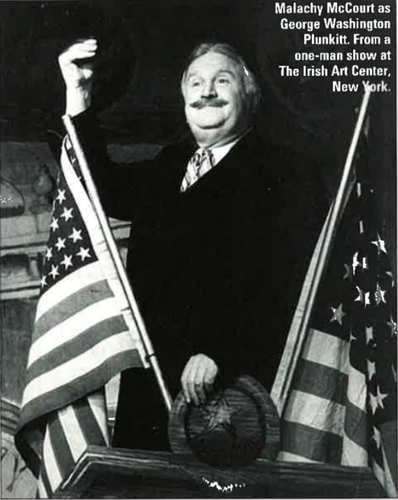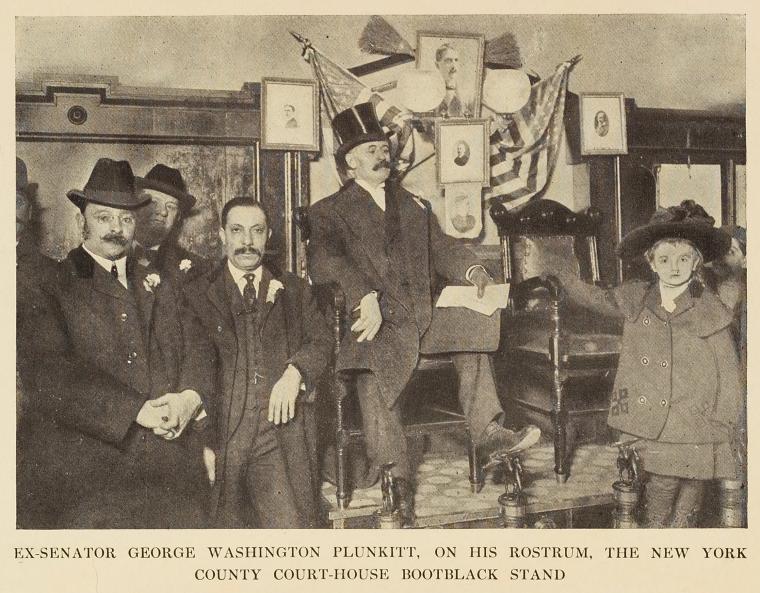Malachy McCourt takes a humorous look at legendary New York politician George Washington Plunkitt.
America, or to be more precise the United States, needs logo imagery for its memories to be flashed on the screen of the mind.
The name Nixon prompts a flash to an awkward man doing the victory sign; Kennedy…grace, charm and the quip; La Guardia…pudgy little man reading the “funnies” on radio. Tammany? Oh yeah, a bunch of cigar-chomping, beerswilling Micks on the take, waving wads of money stolen from the City Treasury. Crooked and corrupt, one and all.
And George Washington Plunkitt…Huh? Who?
George Washington Plunkitt of Tammany Hall…What did he do?
Well, I’m delighted you asked.
George Washington Plunkitt was an amazing man. Born in poverty in a squatter’s hut in what is now Central Park, he disdained what he called book learning, yet he could quote Shakespeare. He didn’t drink, but never condemned those who did. He was amused by flowery oratory, and yet could use a good phrase or two when called upon. Politics was his life, all day and every night. He bailed people out of jail. He got them jobs. Went to their weddings, christenings, bar mitzvahs and funerals. He fed them and got them shelter when they were turned out. All he asked in return? Your vote, sir! (Madam did not vote in those days.)
The Tammany Society that Plunkitt was part of had come into being about 1789. Named for a Delaware Indian chief, its mission and purpose was to be charitable and patriotic and fraternal, while having a good time. Membership was confined to middle-class Anglo-Protestant types and at certain times the lads dressed up as Indians, painted themselves, and did a little whooping. Following tribal tradition they designated the rank of hunters, warriors, sachems and the Grand Sachem (Big Chief).
For all their charity, however, there were no minority folk included — indeed NINA was the order of the day. You guessed it — “No Irish Need Apply” to this conservative assembly of latter-day yahoos. Because Tammany was so powerful, politically as well as socially, they selected who was to run the city and indeed the state. And, my dear, you could not allow these Irish riff-raff to get a moccasin in the door — they’re destroying the country with their Rum, Romanism and Rebellion, not to mention their genetic criminality and violence.
But the Irish couldn’t be kept out.
One day they literally broke down the doors of Tammany Hall and put to flight the conservative yahoos and bigots. And thus began the extraordinary rise of Irish political power and the emergence of the so-called political machine — devised by a people determined to have a hand in plotting their destiny, a power denied them in Ireland. Out of that melange came the vilified Boss Tweed (a Scot) and the first Tammany mayor, Fernando Wood (a Brit). But behind the scenes, running the show, were the taciturn non-drinking, methodical, practical men of Hibernian blood. They inspired the German machine in St. Louis, the Scandinavian machine in Minnesota, the Jewish machine in San Francisco and later, the Italian machine in Rhode Island and the Polish machine in Buffalo.
The Republicans tried the machine route in Philadelphia but when one of their main men stole the zinc roof off a shelter for the poor and sold it for scrap they earned the scorn of G.W. Plunkitt who said, “The Irish was born to rule and they are the honestest people in the world. Show me an Irishman who would steal the roof of an alms house. He don’t exist!” Of course if an Irishman had the political pull he might get the city authorities to put a new one on, land the contract himself and buy the old roof at a bargain.
Our man G.W.P. prized the virtues of honesty (as interpreted by him, of course), silence, sobriety and above all loyalty. At any and all occasions he sang the praises of the great Tammany leaders — Richard Broker, Charlie Murphy, Honest John Kelly — and lesser leaders like Big Jim Sullivan, Little Jim Sullivan and John F. Carroll. “Men who were loyal to their friends even up to the gates of the state prison if necessary.”
George loved politics, his district, his party, and was always delighted when young men expressed interest in the game of politics. So when a young fella named McManus (known as The McManus) came forward, George (who was running for the State Senate) put him on his ticket for an Assembly seat. They both won of course but The McManus had run ahead of George in votes — an unheard of development in the 15th District.
According to George, The McManus had gone about recruiting folks and had conspired to overthrow Plunkitt as leader of the district. It was true that George was eventually overthrown by The McManus, which is when he said, “The Irish above all people hates a traitor and whenever one is in sight, remembering old Ireland, they do him in.” The McManus mini-machine still exists to this day under the leadership of one James McManus.
Plunkitt left school at the age of eleven and became a multi-millionaire when there were only a few of that breed in the country. He once remarked, “If you hear I’ve laid away a million or more don’t come looking to me for an indignant denial. I never deny anything, especially in hot weather.” `Twas with this man that the theory of the difference between honest graft and dishonest graft was promulgated.
According to Plunkitt, “nobody thinks of drawing the line between honest graft and dishonest graft. There’s all the difference in the world between the two.” In his eyes, dishonest graft involved “blackmailin’ gamblers, saloonkeepers, disorderly people, etc.,” while the honest kind might consist of simply finding out in advance where the Parks Department is going to lay out a new park in order to buy as much land as possible and sell it at a good profit. Insider trading you might call it. Making a profit on his “investment and foresight” was how Plunkitt liked to refer to it.
Plunkitt lived long enough to witness some of the Irish betray all principles by crossing over to the enemy Republican side. When he died in November 1924 a huge body of people attended his funeral service. According to The New York Times there was a police detachment plus senators, judges and prominent civic leaders. Even The McManus was there. The mass was celebrated at the Sacred Heart Church on West 51st and 10th Avenue and the Times said there were 23 motor cars even though the residence was only a block and a bit away.
Tammany is gone now, murdered by betrayal and desertion and the triumph of civil service over human service but the ghost of George Washington Plunkitt might be seen — a paragon of sartorial splendor — in his frock coat and top hat proclaiming to all, “If my worst enemy was given the job of writin’ my epitaph when I’m gone, he couldn’t do more than write: `George W. Plunkitt. He Seen His Opportunities, and He Took `Em.'”
Come back, George — save us from the dull traitors and roof-stealing Republicans.
Editor’s Note: This article was originally published in the April / May 1999 issue of Irish America. ⬥



Leave a Reply